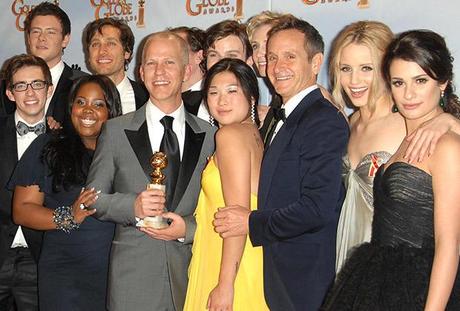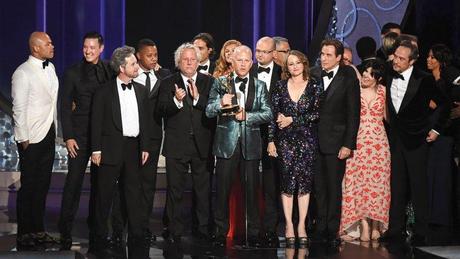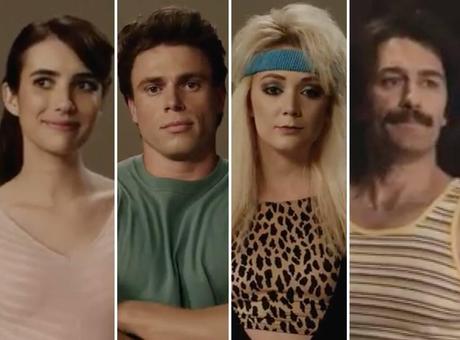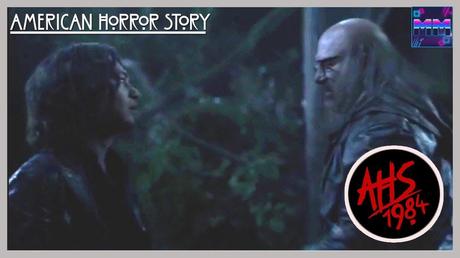
I just finished American Horror Story: 1984 - or AHS: 1984, if you're nasty - and I have some thoughts. What began as a rather staid slasher homage morphed into a completely bonkers ghost story featuring a white La Llorona, an unkillable Richard "Night Stalker" Ramirez (making his second AHS appearance), a psychotic camp counselor turned Reagan-era millionaire, multiple time jumps, and more than a few jokes about the enduring appeal - or lack thereof - of aerobics. Plus, oh yeah, they killed Kajagoogoo! At least one AHS devotee called this the show's worst season yet, "as vapid as its spandex-laden, sex-starved, debauchery-seeking characters."
Well, to paraphrase what a lot people used to say about a certain shock jock, Howard Stern, who rose to prominence in the 80s, I may have been frustrated by certain parts of AHS: 1984, but I kept watching because I wanted to see what it would do next. On that note, it always surprised me. In an age where more and more of our peak TV shows are starting to feel like homework - Watchmen has its own assigned reading now - it feels nice sometimes to escape into campy television performed by people who know exactly what kind of show they signed up for. That's AHS: 1984. It probably helps, however, that this is the first full season of the show I've watched all the way through since Jessica Lange kicked off the whole bizarre affair a decade ago.

Glee was my first introduction to Ryan Murphy. Wait. I tell a lie. My first actual introduction to the man destined to reshape TV in his image was via his boundaries-pushing FX series Nip/Tuck. I'd watched a season or two of that insane nighttime soap, frequently wondering "How are they getting this much sex and violence past the censors?" Come to think of it, that very same question birthed FX into existence. See also: The Shield. However, while I was aware of Nip/Tuck I wasn't entirely aware of the man behind the show nor did I know Murphy had also done the cult favorite high school satire Popular. So, he didn't really appear on my radar until Glee exploded into a cultural phenomenon, one that spawned a reality show spin-off and live tour.
That thing about Glee, however, is it's an all-time great TV pilot, a nearly perfect first half-season of TV, and then pretty much all downhill from there. It became impossible to ignore the show's increasingly schizophrenic shifts in tone since Murphy and his two-creators - Brad Falchuck, Ian Brennan - rotated writing duties from episode to episode and turned out to have very different writing styles. As a result, Glee could feel like a different show week to week, usually not for the better, veering wildly between extreme camp and unironic, after-school-special sincerity.

The critics noticed, and Murphy, Falchuck, and Brennan eventually hired a small writer's room to help shoulder some of the burdens and even out the tonal inconsistencies. The show eventually enjoyed a creative rebound but never recovered from Cory Monteith's death. The final season was down -69% in the ratings from the series high just five years earlier.
Oh, well. By that point, Murphy, Falchuck, and Brennan were prepping Scream Queens for Fox and had already produced four seasons of American Horror Story for FX. That was more than enough material to conclude that Murphy was the kind of TV producer who definitely knew how to start a story and had a real knack for hot-button issues but always seemed to lose interest halfway through. As a result, I viewed every new Murphy show post- Glee with a heavy dose of skepticism.
Then American Crime Story: The People Vs. O.J. happened.
And Feud: Bette and Joan.
And American Crime Story: The Assassination of Gianni Versace.
Suddenly, the great creative wanderer had gained discipline and focus. Every one of these shows started out with a great premise, but unlike prior Murphy efforts, they didn't eventually devolve into all-ideas-at-the-wall randomness at the end. That's not to say there wasn't still campy humor or the occasional tonal shift. The People Vs. O.J., for example, sometimes feels like Cuba Gooding, Jr. and David Schwimmer are acting in a different TV show than Sarah Paulson. However, by moving into making so many based-in-fact historical stories Murphy gained a valuable asset: structure, stories with an understood beginning, middle, and end. He has been rewarded with the best reviews of his career, an eye-popping deal with Netflix, and so, so many Emmy awards.

Not that Murphy needed any more awards. Partially due to category fraud, AHS alone has been nominated for 96 Emmys, and by some measures, it's the most-watched show on FX and the older seasons remain very popular on Netflix. Its contracted to come back for a tenth season next year. ( AHS: 1984 was its ninth.) Beyond that, nothing is guaranteed. For now, AHS remains the place where Murphy can stretch a little and have fun twisting horror genres into pretzel-shaped pieces of camp TV.
If you've never seen American Horror Story before, it's an anthology show that takes on a different horror subgenre every season, with characters and stories occasionally calling back to prior seasons but usually not. Actors like Lange, Sarah Paulson, Emma Roberts, Billie Lourd, Evan Peters, and Kathy Bates usually play a new character every season but sometimes sit seasons out. AHS: 1984, for example, doesn't have Lange, Paulson, Peters, or Bates.
Earlier, I described AHS: 1984 as starting as a slasher and ending as a ghost story, but that is hardly unique. Just about every AHS season, from what I can tell, follows a similar trajectory, and it's not just the normal "well, every season of TV grows and morphs as it goes" thing either. No, if you watch the first episode of an average AHS season and then skip everything and jump straight to the finale you won't just be surprised by what became of the characters; you'll feel like you're watching an entirely different show. Chances are high the characters you met in the premiere won't even be themselves anymore in the finale, and the premise you thought you signed up for will have switched into something else, probably more than once.

I didn't fully appreciate this when I started AHS: 1984, but I certainly do now. A standard, Friday the 13th slasher scenario plays out over the first couple of episodes:
It's 1984, and Camp Redwood, which had been closed down due to a tragic massacre many years earlier, is about to reopen. However, a killer (John Carroll Lynch, playing Mr. Jingles) has come home, and the clueless camp counselors (led by Lourd, Leslie Grossman, Roberts, and Matthew Morrison, in his first Ryan Murphy appearance since Glee) are sitting ducks. Except there are multiple killers, just about every one of the counselors is hiding a dark secret, at least one of them is actually operating under a false identity, and there's something vaguely supernatural happening on the periphery, like the mysterious re-emergence of a counselor who was killed in the original massacre but now seems unharmed, unaged, and unaware that any time has passed.
It doesn't take long for the season to get even weirder. Spoiler, the dead quickly outnumber the living, but all of the characters remain since the camp has some kind of curse dooming all those who die there to forever walk the grounds. On top of that, the series doesn't stay in 1984 for long. There are flashbacks, flashbacks within flashbacks, small-time jumps forward, and then a pretty damn big one so that the finale takes place in 2019.

In a story that ultimately stretches across a 65-year period, good guys become bad and then good again, bad guys turn out to have been framed, cheap 80s jokes give way to a sentimental story about a reformed killer and his estranged son, and the focus inevitably shifts from slasher tropes over to figuring out why they're all still around as ghosts. The season ends without explaining that last part. There are no Winchester Brothers to come in and burn the bones.
It's all a bit much to take in, but it's also so very, very Ryan Murphy. "Call me camp. Call me crazy. Call me wild. Call me extreme. Call me erratic," he recently told Time Magazine. "The one thing you can't say it that I don't try." He paused a beat before laughing and concluding, "Actually, I don't care what you call me. As long as you call me."
In typical fashion, he's created a season of slasher TV that loses interest in the rather limiting slasher tropes around halfway through and then meanders into a bunch of easy jokes about 80s capitalism. The season ultimately elevates Leslie Grossman's counselor-turned-killer character into the real villain, presenting her as a quintessential Murphy character who spews highly articulate vitriol at all who cross her path.
And I loved it.

This season has a Freddy vs. Jason - slasher vs. slasher - moment as a final girl candidate dangles in a booby trap, struggling to escape. In the end, the girl escapes, and the slasher who loses the fight is actually reanimated by Satan.
Elsewhere, a jock-turned-ghost struggles to forget how much it hurt being decapitated, the leading final girl candidate ends up on death row because her "it wasn't me, the ghosts, Richard Ramirez, and Mr. Jingles did it" sounds positively insane, and the greatness of Billy Idol is re-affirmed as often as possible.
It's erratic, wild, crazy, and not particularly interested in sticking to a formula. It was a fun 9 weeks of Ryan Murphy bonkers storytelling with completely committed performances all around.

